| |
| |
Photographer,
Location |
Images |
Comments |
|
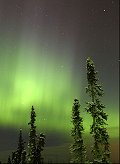
|
M. Scott Moon,
Soldotna, Alaska, USA
Dec. 14, 2006 |
#1,
#2, more |
Tonight's aurora appeared at about 6:30 p.m. on the northern horizon. The show continues to build in intensity as the aurora rises higher in the sky.
|
|

|
Jeff Hapeman,
Cross Plains, Wisconsin.
Dec. 14, 2006 |
#1,
#2, more |
Very bright
aurora from the CME caused by the X3 solar flare from sunspot
930. Visible at dusk, approximately 5:20pm CST through 10:30pm
CST when I arrived in downtown Chicago. The peak intensity
that was visible was about 6:30pm CST in southern WI; after
that it clouded up.
Photo
details: Canon
5D, 10s exposures at ISO 1250, f/2.8 with a 14mm L lens.
|
|
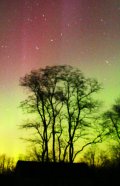
|
Richard Bell,
Kalamazoo, MI
Dec. 14, 2006 |
#1,
#2, more |
We're so lucky!
First, we get to observe the Geminid meteor shower on Wednesday
then we get more Geminids and a nice aurora display on Thursday.
The great thing is that both nights were clear - in Michigan
- in December. An early holiday gift!
Photo
details: Canon
300D with the 18-55 mm Zoom lens set at 18 mm.
|
|
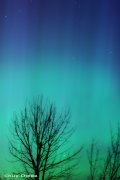
|
Chuy Ojeda,
Saint Francis, Wisconsin, USA
Dec. 14, 2006 |
#1,
#2, #3,
#4 |
It was nice
to see the auroras again. Even the light polluted downtown
Milwaukee was no match for the Northern Lights!
Photo
details: Nikon
D70 loaded with a custom curve, 50mm lens set to f1.8,
ISO 400, 5/10 seconds exposure.
|
|
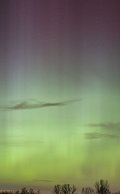
|
Greg Sellek,
Near Madison, WI
Dec. 14, 2006 |
#1,
#2, #3 |
Finally the
clouds cleared enough to get these shots in. We could tell
there were bright aurora becuase the clouds were all green!
Photo
details: Canon
20D, 28mm lens @ f/2.8, 20 seconds at ISO 400.
|
|

|
Ed Kreminski,
Westerville, Ohio, USA
Dec. 14, 2006 |
#1 |
Clouds made
it hard to see the aurora that seemed to be indicated by
the various solar data plots. Eventually, a few glowing
clouds appeared. The photos later showed them to be green
aurora. It's been a long time since we've had aurora here
in central Ohio and it's good to see them again.
Photo
details: Olympus
E-1 at 14mm, 100 ISO, 20s at f2.8.
|
|
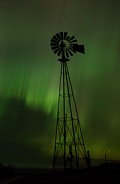
|
Lyndon Anderson,
15 miles north of Bismarck, North Dakota, USA
Dec. 14, 2006 |
#1,
#2, #3,
more |
I have seen
many displays, but the substorms during this one were unbelievable!
|
|
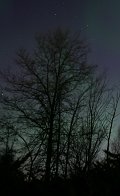
|
Peter Tirsek,
Saginaw, Michigan, USA
Dec. 14, 2006 |
#1,
#2, #3 |
The aurora was
easily visible to the naked eye without having to leave
the city. While we were out looking for aurora, the sky
treated us to another magnificent sight: A bright fireball
streaking across the sky before breaking into smaller pieces.
Unfortunately, the camera was pointed in the wrong direction
at that time, but I'm still happy to finally get some shots
of the aurora.
Photo
details: Canon
EOS 30D, 18mm, 20-30s exposures at F/4.0 and F/4.5,
ISO 200 and 400. Incandescent white balance to reduce the
muddy glow of city lights, and add a bit of "blue sky" effect.
|
|
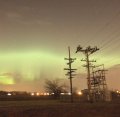
|
Sal Viviano,
Washington, Michigan USA
Dec. 14, 2006 |
#1,
#2 |
Photo
details: Nikon
D100 17mm lens
|
more
images: from
Brian Bledsoe of Piseco, New York, USA; from
Erkki Rauhala
of Uurainen, Middle of Finland; from
Matthew Landelius just north of Ann Arbor, Michigan; from
Jeff Brusewitz of Milwaukee, Wisconsin; from
Rodrigo Roesch of Mettewa IL; from
Scott Manly of Ionia, MI, USA; from
Xiaoyang Gu of Zenorsville, Iowa;
|
|